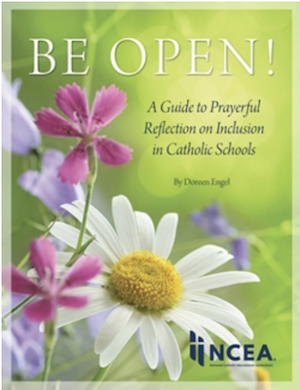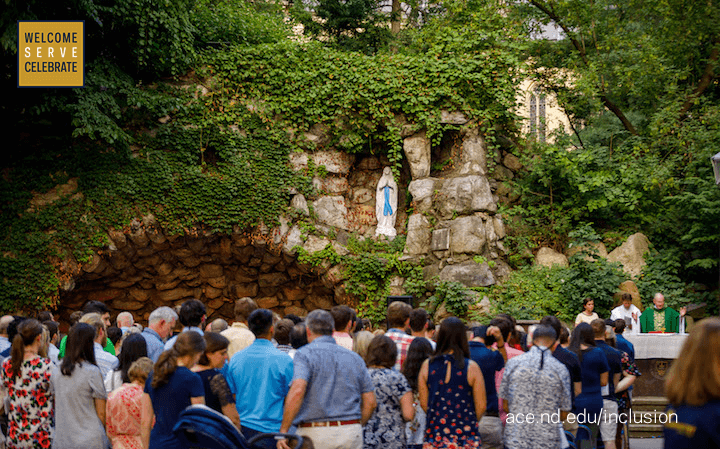The Program for Inclusive Education is grateful to share a special message from Diane Freeby, a colleague of the Alliance for Catholic Education at the University of Notre Dame. This piece highlights our Blessed Mother during the month of May. It also explores the good works of Doreen Engel-a long time educator and champion of inclusion, and an adjunct faculty member at the Andrew M. Greeley Center, Loyola University Chicago. It is PIE's privilege to collaborate with faithful educators across the country who support and advocate for inclusion in Catholic schools. There is much to be done with this mission and the partnerships are valued. Thank you both for your gracious efforts!
~Christie Bonfiglio, Ph.D.; Director of the Program for Inclusive Education
As we move into the month of May, it is often a challenge for children to focus on school. The weather is (finally!) getting nicer, and a gaze out the window leads to thoughts of leaving the classroom behind for summer vacation. As teachers, we might also fight the urge to look ahead, anticipating a little change of pace and the blessed opportunity to recharge our batteries, knowing we have much to prepare as the next school year will be upon us before we know it.
We quickly snap back to reality as a flurry of year-end activities awaits us. First Holy Communion and May Crowning are highlights of the Catholic school calendar, and this month holds so much grace for us all.
During a month dedicated in a special way to Mary, all Catholic educators might reflect on the Magnificat and her selfless "yes" to God's special invitation. We, too, have said "yes" to the Lord's call and are asked to trust Him as we meet the challenges of each new day. As educators who embrace inclusion, we are sometimes asked to trust a little more.
"I believe that inclusion of children with disabilities can make for a better school life when it is done prayerfully, intentionally, and with the understanding that all change is not bad."
In her book Be Open! A Guide to Prayerful Reflection on Inclusion in Catholic Schools, Doreen Engel introduces us to children with disabilities, their parents, and the teachers who welcome them into the classroom. Doreen, an educator with over 30 years of experience in inclusive education, admits the challenges are great but so are the rewards. It all begins with the openness to listen to God's voice.
"It was through prayer, and in particular a deep reading of specific Gospel passages," Doreen writes, "that I often found the courage to say 'yes' and the strength to learn and do what I had to do so that a child would belong to our school community, not just sit in the classroom."
Doreen continues, emphasizing how true inclusion blesses the entire class and begins with just one "yes."
"Through prayer, I found my own relationship with God nurtured, sustained, and magnified because of the children with disabilities and their families that I have known and loved."
But even in a school setting where God is welcomed and we try to teach the Gospel by example, inclusion is not always a concept that is well received. Doreen shares some fears–ones we have experienced at times–that teachers have articulated to her over the years when schools are challenged to be truly inclusive: creating behavior problems, ruining the reputation of the school, overworking the faculty, using fragile children just to fill seats, and hurting the academic opportunities of other students.
Doreen emphasizes that while these are valid concerns to raise, Catholic schools nationwide have faced these same concerns and have still been able to successfully include children with disabilities.
"Inclusion will make your school better." Doreen is quite sincere when she says this. "It is just the same way that I feel reading aloud, eating dinner together, and family game nights can make for a better home life. I believe that inclusion of children with disabilities can make for a better school life when it is done prayerfully, intentionally, and with the understanding that all change is not bad."
"It is worth some sacrifice to achieve it for those we love."
Because our Catholic school communities are an extension of our family, Doreen uses this example to illustrate her point:
"Once we believe eating dinner together is a good thing for our family, we will make the work and social sacrifices that we have to make in order to achieve it, at least a few times a week. We will not expect to see the benefits the first week we try it. We will not overreact when our pre-teens roll their eyes and our boss is not pleased that we ran out the door at 4:30 p.m. We will hang in because we believe it will make a better family life for us, and over time, it does. We believe that eating dinner together is better for our family because there is research that tells us it is so, and because others have testified to the benefits. It is worth some sacrifice to achieve it for those we love."
She continues.
"Inclusion is much the same. Research tells us that it improves school climate and academic outcomes. My voice is joined with many others, including faculty members of Catholic schools that have received the Blue Ribbon Award, to say that inclusion will, in fact, improve your school. The beginning will at least be inconvenient and perhaps awkward. Some might be resentful. When we hang in, because we believe it will make our school family stronger, we see the rewards."

In chapter eight of her book, Doreen introduces us to Maggie. Maggie is an assistant principal at a Catholic school who began her career as a first-grade teacher at that school. She had two friends, Cheryl and Doris, who greatly influenced her journey as a teacher and in particular, as an inclusive Catholic educator. They both had sons with intellectual disabilities, and they both passionately believed their boys belonged at a Catholic school.
"Cheryl's son Shaun had significant physical and learning challenges, but Cheryl and her husband dreamed of him attending their parish school along with their other sons. Shaun wanted to be with his siblings. Meanwhile, Maggie's friend Doris gave birth to a little boy, Ben, who had Down syndrome. From the beginning, Doris asked Maggie if he could be in her class one day. Even though at the time of Ben's birth, Shaun had not been able to join his brothers, Cheryl advocated for Ben's acceptance as well.
"Time went by. Ben was ready to enter first grade but Shaun was older and sicker. He required significant services and it seemed as if his parents' dream of sending him to the parish school was not to be. But for Ben, there was a chance.
"Maggie agreed to have Ben join her first-grade class, even as she wondered how it would all work out. She sought the advice of other teachers, she read, she learned, she tried, she failed, she kept going."
Lo and behold, it worked! Ben made progress.
"The other children enjoyed him as a classmate," writes Doreen. "Maggie and her colleagues began to see the benefits of having him in the class. Ideas developed for Ben helped many other children. The students pulled together, the way classmates do, and supported one another in their schoolwork and in their school day. Inclusion was working!"
Sadly, Shaun never had the same chance. He died at the age of 14. Maggie recalled how, despite no burial plots being available, in his kindness the pastor found room for him to be laid to rest in the church cemetery. "If we are a place of welcome," reflected Maggie, "why is it that we couldn't find room for Shaun until he died? Where was the justice in this? Where was our love for one another, as Christians? Where indeed?"
Doreen continues.
"Ben finished his years at the Catholic elementary school and went on to the local Catholic high school. He is now a young adult, with a full life that includes active participation in his parish, employment, and independent living. Friends he made at both Catholic schools are still part of his social circle. It wasn't completely smooth sailing, but in sum total he and his family were very pleased with his education. Maggie and Ben's example inspired other Catholic schools to begin this work as well. In fact, together Maggie and Ben had preached the Gospel by example.
"And Shaun's family? They showed the incredible love and generosity of other parents of children with disabilities that I have known. They created a foundation in Shaun's honor which ran for many years. It gave parents of children with disabilities the opportunity for respite and self-care. Shaun's parents knew firsthand how important this is. Cheryl went on to work for Catholic schools, as an inclusion specialist. Ben was one of her students.
"When Catholic schools tell me they have no resources, I remember that day. Maggie's school had nothing, except a first-grade teacher who said yes."
Doreen's book is a terrific resource that includes Gospel passages for reflection and material for use in a school prayer service. After sharing Maggie's story, she included the story of Jesus' rejection at Nazareth (Matthew 13:54-58):
He came to his native place and taught the people in their synagogue. They were astonished and said, "Where did this man get such wisdom and mighty deeds? Is he not the carpenter's son? Is not his mother named Mary and his brothers James, Joseph, Simon, and Judas? Are not his sisters all with us? Where did this man get all this?" And they took offense at him. But Jesus said to them, "A prophet is not without honor except in his native place and in his own house." And he did not work many mighty deeds there because of their lack of faith. – New American Bible, Revised Edition
Are we preventing miracles?
"When I read Matthew's description of Jesus' return to Nazareth, I see that Jesus was unable to work many miracles because of the lack of faith his neighbors and perhaps even some family members had in him," writes Doreen. "It is painful for those of us who speak about inclusion to be dismissed by our colleagues and friends."
"Sometimes we must leave the comfort of our home and what we know before we can see who we are and what we can become.
"It does not mean we lose our love for those who gave us home, as Jesus' devotion to his mother shows. It simply means that we cannot let a limited view of those around us keep us from becoming the person God is calling us to be.
"God called Maggie and she answered. How is God calling you?"
Let us pray:
Father of all that is good and holy,
We ask that You bless us with Your infinite love and mercy
as we work with all students in your image.
Those students that read with grace, and those that need grace to read.
Those that lift others up, and those that need to be lifted up.
Those that embrace learning, and those that need an embrace to learn.
Those that make us smile, and those that need a smile.
Grant us the knowledge, patience, and compassion to serve all students
in our care for they have Your gifts to celebrate.
We ask this in the name of Your Son, Jesus Christ. Amen.
Prayer Written by: Christie Bonfiglio, Ph.D. - Director, Program for Inclusive Education
Purchase Your Copy of "Be Open!" from NCEA
Would you like to become an inclusive educator? If you hurry you can still apply to be a member of PIE 3!
 Alliance for Catholic Education
Alliance for Catholic Education
